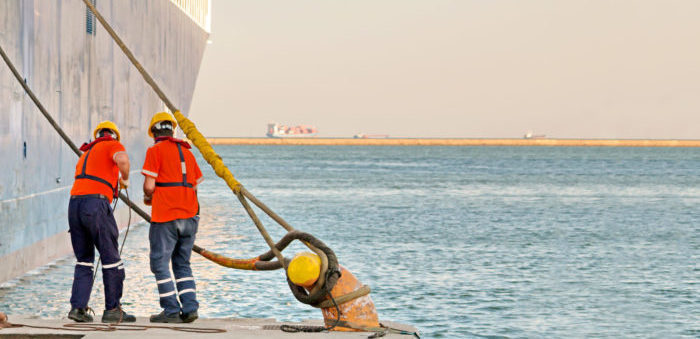This time, our special column, in association with The North of England P&I Club, sheds light on crew health. Health is the most important thing for anyone, let alone seafarers due to their challenging job. Rest hours, working out, food, better accommodation and mental health, are all key elements towards ensuring a healthy lifestyle. For this reason, we asked maritime experts to make their assessment whether the industry has taken significant action towards, asking their view on the following question:
Are we doing enough to keep crew healthy?
 Capt. Pradeep Chawla Chairman, GlobalMET & Managing Director QHSE & Training, Anglo-Eastern Univan Group Company |
 Dr. Philip Belcher Marine Director, INTERTANKO |
|
| No. While responsible companies are doing a lot for their seafarers, as an industry, we can and must do more.
My main concerns are regarding inadequate facilities in some parts of the world to get immediate medical evacuation for ill or injured seafarers. It is the duty of the industry to ensure that helicopter and fast rescue vessels are available to save the seafarers while near the coasts. I also believe that there is a lot of stigma in the maritime industry about mental illnesses. Seafarers are reluctant to seek help for mental issues like depression due to a fear of losing their future employment. Industry agreements could also do better for helping seafarers suffering from extended illnesses or recovery time after accidents.” |
Maybe. Gyms, better food, better accommodation and quality bedding are in place on many ships. Companies give business flights for those who have performed exceptionally. All improve the physical welfare of seafarers and has led to discussions on when medical tests should be done ie before or after a trip. We do need to get seafarers out of cabins and into communal spaces as humans are social animals and that is for mental health reasons. Supplying board games and setting up inter-fleet competitions have seen positive effects. Ships can never duplicate home life, but more can and should be done, hence the maybe. | |
 Belinda Ward Director (Claims), North P&I |

Frank Coles |
|
| No – probably not! Arguably there is a moral obligation for all industries and employers to take some responsibility for the welfare of their employees and it is indisputable that a healthy crew, in body and mind, is much more likely to perform more effectively resulting in a better run, and thus safer, ship.
However; in what can sometimes be a challenging working and living environment we need to remain conscious of the fine line between introducing measures on board to improve crew health on the one hand, and encroaching on the personal freedom of adults to make their own lifestyle choices, on the other. As an absolute minimum ship operators need to ensure that their seafarers are able to adopt healthy practices, even if they choose not to. For mental wellbeing this can mean encouraging a supportive working environment rather than a combative one, and for physical welfare, providing a healthy and varied diet. The effect of a capable and personable cook, accompanied by a reasonable daily food budget, on shipboard morale cannot be under estimated! Hours of work and rest as set out in the STCW Convention should also be followed. But can more be done? Providing training on the importance of regular exercise and what a healthy diet looks like can be helpful and within the industry there is a wealth of advice available which both shipowners and crew can take advantage of. More recently there has been an increasing focus on mental health with much more support available than ever before. Perhaps the overall approach is rather hit and miss however and manning agents, insurers, operators and especially shipowners should all regularly ask themselves whether they are each doing enough to keep crew healthy, and develop (and follow) policies accordingly. Seafarers can also be encouraged take responsibility for their own welfare and maybe consider themselves as an investment for their family’s future. In the same way a taxi driver’s employment might be jeopardised if he doesn’t maintain his car, a seafarer who doesn’t look after himself might no longer be fit for work at sea and be putting his continued employment at risk for reasons of lifestyle. |
No, keeping the crew healthy is the most talked about and least addressed matter in the maritime industry. Rest hours is one of the most abused rules in the maritime industry and this alone creates a stress level that is unacceptable. When you couple this with a lack of positive stimulation on board, as well as poor quality communications with ashore, we continue to have an environment that is a contributor to the growing mental health issues on board. Sadly the weakest link in solving this problem is the admission in the right circles and shored based businesses that it is a problem. Nobody wants to address the issue full on and nobody wants to admit that not enough is being done. | |
 Prof. Helen Sampson Director, Seafarers International Research Centre |
 David Appleton Professional & Technical Officer Nautilus International |
|
| No. In many cases much more can be done to protect seafarers’ health. Food is very important. Reversing the pattern of cuts to the galley staff and increasing food budgets would be a good starting point. Stress reduction is also critical. To mitigate the negative health impact of bureaucratisation, criminalisation and work intensification, companies need to do more to stimulate shipboard social life. This requires provision of spaces where all seafarers can get together and, in some cases, a careful re-evaluation of the pros and cons of currently banned activities such as the alcohol consumption and barbecue parties. The provision/maintenance of a range of recreational facilities is also imperative including: indoor/outdoor courts; swimming pools; the internet; DVD/book libraries; and gymnasia. | There is a lot of excellent work being carried out to address issues relating to seafarers’ physical and mental health. Whilst this work is of great value, it can only address the symptoms and not the root causes. Whilst we have a regulatory system in place that allows seafarers to work hours that have been proven to be damaging to health, to have manning levels that are totally unrealistic in terms of expecting crew to safely complete all necessary tasks and, seafarers regularly denied access to communications and shore leave we cannot say that enough is being done to keep crew healthy. | |
 Capt. Kuba Szymanski Secretary General, Intermanager |
 Natalie Shaw Director Employment Affairs, ICS |
|
| MAYBE. Keeping crew healthy should be a priority for all ship operators, not only from the perspective of good management but also because our crew are our greatest asset and investment.
InterManager members are working collectively to raise standards well above MLC requirements. Our members make crew health and well-being a priority, ensuring seafarers are provided with nutritious meals on board, sport and recreation facilities, and that ‘healthy behaviour’ is promoted. The best ship operators crew vessels well above minimum manning levels to ensure fatigue of sea staff is minimised. In addition, they provide training in mindfulness and wellbeing, and support onboard initiatives such as healthy lifestyle seminars. Members of InterManager participate in industry campaigns and projects which enhance healthy lifestyles – such as Wellness at Sea organised by the Sailor’s Society and ISWAN’s Psychological Wellbeing – as well as encouraging and supporting staff to participate in events like Seafarers’ UK’s 24 Peaks Challenge. For themselves, seafarers recognise the companies which provide a healthy working environment and this is reflected in their employment preferences. While we as an industry must tackle those companies, which fail to meet modern expectations, crew will also vote with their feet and make it clear where improvements are needed! |
Yes but more is required. Seafaring has always been a dangerous occupation. Long voyages, extreme weather, illnesses and accidents, occupational risks and isolation from medical care and assistance available to shore workers all affect crew health. However, the ILO Maritime Labour Convention 2006 (MLC) outlines clear provisions to ensure crew members stay healthy. Greater provision for seafarers and protection for their employers would exist if over 50 countries who are party to SOLAS, MARPOL and STCW were to ratify the MLC.
The MLC ensures that 1) seafarers have medical certificates demonstrating medical fitness for duties, 2) there is adequate medical care on board ships and ensuring prompt access on board and ashore, and 3) Health and Safety and accident prevention procedures exist. Seafarers working onboard vessels of flag States without such provisions, is no longer appropriate in the 21st century. This might be resolved by using labour supply country legislation, before deploying seafarers, but this does not always happen. Some countries more stringently apply standards than others, particularly for medical examinations. More robust testing would identify potential issues upstream reducing medical incidents and repatriations. ICS actively encourages Shipping Companies to choose MLC compliant flags and lobbies outstanding countries to ratify the MLC to ensure adequate medical provision for seafarers. |
|
 Capt. Jeff Parfitt Director (Maritime), CHIRP |
 Gavin Lim Regional Development Manager for Asia, Sailors’ Society |
|
| NO. CHIRP Maritime is currently engaged in supporting a new study by the WMU into Hours of Rest. The practice of mis-reporting of Hours of Rest by seafarers is common in areas of the industry. Such practise leads to an inaccurate picture of hours worked. Even if the hours recorded were to be considered accurate, the accepted norm of an 84 hour week cannot be honestly described as a healthy work environment. In addition our recent publication “Missing the Hits” reports on the consequences of inaccurate and insufficient data on health and illness in the industry. | Yes. Companies generally follow what are mandated by the regulations. There are many companies that go beyond the bare minimum by providing better food, cabins, recreational facilities, medical care and even running wellness workshops either in-house or through third parties. All these mandated and voluntary initiatives are good but one area we see a need is for continued education of the seafarers and their families that being healthy and staying healthy is a lifestyle choice. They have to do their part. It has to be internalised in order to keep crew healthy. | |
 Ben Bailey Director of Advocacy and Regional Engagement, The Mission to Seafarers |
 Capt. John Dickie Managing Director, Joint Development Associates Ltd. |
|
| MAYBE. The seafarers we at the Mission engage with through our 121 seafarers’ centres and our Seafarers Happiness Index regularly tell us that whilst they try to keep healthy during their time at sea, the pressures of the job often get in the way. In our recent Seafarers Happiness Index, respondents marked this area 6.84/10 – a score which has been steadily rising over 2019. Despite this, many felt that on board space for gyms and recreation was being reduced and that there was a trend of downsizing the accommodation on offer. In other areas – such as the provision of food – there was a concern by some that cooks required more training in making nutritional meals and that companies should invest more in higher quality produce. Good food and dedicated spaces for seafarers to relax when off-duty are easy things for companies to implement, but that is only one part of the solution. Seafarers themselves must be encouraged to take personal responsibility for their own health and wellbeing; taking shore leave when they can, playing sports and learning new things instead of being cooped up in their cabins. | NO. A start has been made but there is a long way to go. A healthy person is fit both physically and mentally as well as having healthy nutrition to make the body able to cope with the stress of working at sea. A holistic approach must be made using all factors including communications to family and friends and a workable exercise regime for all. Due to the diversity of nationalities at sea there needs to be a common sense approach to nutrition which is compatible with ethnic views on food and how it is prepared. The main argument is that the problems are being addressed, it is how long until they are met. |































































